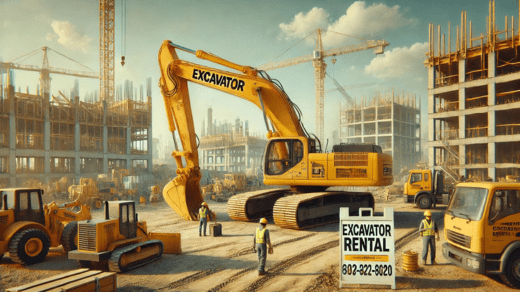The Top Excavator Rental Mistakes and How to Avoid Them

Renting an excavator is often the most cost-effective and efficient solution for completing heavy-duty construction projects. From digging trenches to demolition work, an excavator rental can help contractors tackle various tasks without the financial burden of purchasing expensive equipment. However, while renting an excavator is straightforward, there are several common mistakes that contractors and project managers make, leading to costly delays, inefficiencies, or even safety hazards.
In this blog, we’ll cover the top excavator rental mistakes and offer tips on how to avoid them, ensuring your project stays on track and within budget.
1. Choosing the Wrong Size Excavator
One of the most common mistakes made when renting an excavator is selecting the wrong size for the job. Excavators come in a range of sizes, from compact models designed for tight spaces to full-size machines that can handle large-scale earthmoving tasks. If you rent an excavator that’s too small, it may not have the power or reach to complete the task efficiently. On the other hand, renting a machine that’s too large for your project can lead to unnecessary costs and make it difficult to maneuver on smaller job sites.
How to Avoid It:
- Assess the Job Site: Take a close look at the size and conditions of your job site. If you’re working in a confined area or near buildings, a compact excavator might be the better choice. For open spaces or heavy-duty projects, consider a larger machine.
- Determine Project Requirements: Evaluate the scope of your project and the depth and volume of digging required. For smaller tasks like landscaping or light trenching, a compact or mid-sized excavator may suffice. Larger excavation projects like foundation work or demolition may require a full-size excavator.
- Consult with the Rental Provider: If you’re unsure of what size excavator to rent, consult with the rental company. They can help you determine the right model based on your specific project needs.
2. Not Considering Attachment Options
Excavators are highly versatile machines because they can be fitted with a variety of attachments, from buckets to hydraulic breakers. However, many contractors make the mistake of not considering what attachments they need when renting an excavator. Without the right attachment, you may not be able to complete specific tasks, or you may end up renting additional equipment unnecessarily.
How to Avoid It:
- List Out Project Tasks: Before renting, identify all the tasks your excavator will need to perform. Will you need to dig trenches, break concrete, or move materials? Knowing what you need the excavator for will help you select the right attachments.
- Choose the Right Attachments: Based on the project requirements, select attachments that maximize the versatility of the excavator. Common attachments include:
- Buckets (for digging and loading)
- Hydraulic breakers (for demolition)
- Augers (for drilling post holes)
- Grapples (for picking up and moving debris)
- Ask About Attachment Availability: When speaking to the rental provider, ensure the necessary attachments are available for the model you are renting. This will save time and ensure that the machine can perform all the required tasks.
3. Ignoring the Condition of the Equipment
Another major mistake contractors make during excavator rental is neglecting to inspect the condition of the machine before taking it to the job site. Equipment that is poorly maintained or in disrepair can cause breakdowns, leading to project delays, costly repairs, or even safety hazards.
How to Avoid It:
- Inspect the Equipment Thoroughly: Before accepting the rental, conduct a visual inspection of the excavator. Check for visible signs of wear and tear, including cracks, leaks, and rust. Make sure the hydraulic lines, tracks, and attachments are in good working order.
- Test the Machine: If possible, test the excavator’s controls and functions before leaving the rental facility. Ensure the engine starts smoothly, the hydraulics operate without issues, and the machine is responsive.
- Ask About Maintenance Records: Reputable rental companies will keep detailed maintenance records for their equipment. Ask about the excavator’s service history to ensure it’s been regularly maintained and inspected for safety.
4. Not Planning for Transportation and Delivery
Excavators are heavy and large pieces of equipment, and transporting them to and from the job site requires careful planning. Failing to coordinate delivery and transportation can result in delays or extra costs, especially if you don’t have the right truck or trailer to move the machine.
How to Avoid It:
- Plan Ahead: Determine how you will transport the excavator to your job site. Many rental companies offer delivery and pickup services, but this typically comes at an additional cost. Be sure to budget for these services if you don’t have your own transportation.
- Ensure Proper Equipment: If you plan to transport the excavator yourself, make sure you have the appropriate trailer and towing capacity for the size of the machine. Oversized equipment may require special permits for transportation, depending on local regulations.
- Coordinate Delivery Timing: Schedule the delivery and pickup of the excavator to align with your project timeline. Avoid renting equipment too early, which could result in unnecessary rental fees, or too late, which could cause delays in the project.
5. Underestimating Rental Duration
Many contractors underestimate how long they will need to rent an excavator, leading to either rushed work or unexpected rental extensions. Extending your rental period can be costly and may affect your overall project budget.
How to Avoid It:
- Accurately Estimate Project Timeline: Review your project timeline and factor in all tasks that require the excavator, including potential delays. It’s better to rent the machine for slightly longer than you think you need, rather than rushing to finish and risking mistakes.
- Ask About Rental Terms: Understand the rental company’s policies regarding extensions. Some providers offer discounted rates for longer-term rentals, so it might be more cost-effective to rent for a longer period upfront than to extend the rental later.
- Monitor Progress: Keep a close eye on your project’s progress and communicate with your team regularly. If you foresee delays or changes to the timeline, contact the rental provider as early as possible to extend the rental if needed.
6. Overlooking Operator Training and Safety
Even if you rent the perfect excavator, your project may suffer if the machine is operated by an untrained or inexperienced operator. Operating an excavator requires skill and knowledge of safety protocols, and failing to adhere to these guidelines can result in accidents, damage to the equipment, or project delays.
How to Avoid It:
- Ensure Proper Training: Only allow certified or experienced operators to use the excavator. If your team doesn’t have a qualified operator, consider hiring one or requesting operator training from the rental provider.
- Review Safety Guidelines: Excavator operation comes with certain risks, and following safety guidelines is critical to preventing accidents. Before starting the job, ensure that the operator and crew are familiar with safety protocols, including the safe use of attachments, operating within load limits, and working in tight spaces.
- Conduct a Safety Briefing: Before using the excavator on-site, hold a safety briefing to review the equipment’s features and safety procedures. This ensures that everyone on the job site understands the risks and how to minimize them.
Conclusion
Renting an excavator can be a great way to save money and improve efficiency on your construction project, but it’s important to avoid common mistakes that can lead to delays, safety issues, or unnecessary costs. By selecting the right size and attachments, inspecting the equipment, planning for transportation, and ensuring that your operators are properly trained, you can make the most of your excavator rental and keep your project running smoothly.
Partnering with a reliable rental provider is key to avoiding these mistakes. Look for a company that offers well-maintained equipment, transparent pricing, and excellent customer support to help you navigate the rental process with ease. With the right approach, you can stretch your budget, complete your project efficiently, and get the job done safely.




